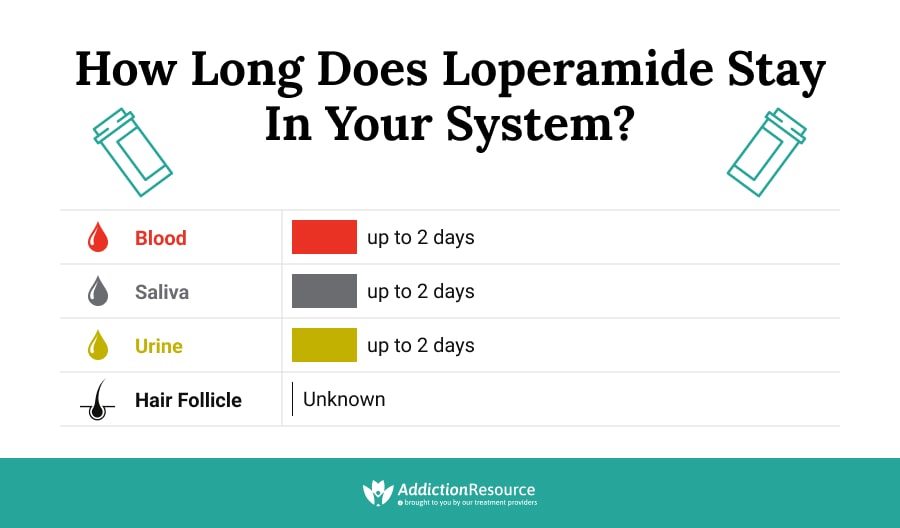Loperamide Hydrochloride, under the brand name Imodium, is under the drug class antimotility agents and its main use is for the management of diarrhea. This medication’s effects are decreasing the flow of fluids and electrolytes into the bowel, therefore, shortens the number of bowel movements.
Table Of Contents:
Moreover, this medication is also considered as an opioid drug. In 2018, around 580,000 prescriptions of Loperamide were issued in the United States. Although many people use this as an over-the-counter drug treatment for diarrhea, most of them do not know how long it stays in their systems.
Loperamide is quickly distributed throughout the body systems and in this article, information about this medicine’s metabolism, how long for Imodium to work, Imodium half-life and the factors affecting its half-life, appearance of of this medication on drug tests, and help options during Imodium addiction will be provided.
How Long Does Imodium Last?
According to a report, it typically takes about 2-3 days for this medication to be completely removed from the body. Moreover, this drug does not show up on routine drug screening but it can be detected in specialty tests for blood and saliva. In this section information about how long does Imodium last in the blood, saliva, urine, and hair will be provided.
How Long Does Loperamide Stay In Blood?
Loperamide is a safe medication when patients take them properly. However, when a patient takes too much of the dose of this medication, not only overdose and adverse effects such as too much constipation may occur, but also prolongation of the drug in the blood. According to the FDA, this medication can stay in the blood for up to 2 days.
How Long Does Loperamide Stay In Saliva?
One specialty screening for Imodium detection in the saliva is by using liquid chromatography. According to a study, the duration of Loperamide hydrochloride in the saliva is close to that of the blood which is 2 days.
How Long Does Loperamide Stay In Urine?
This drug can be detected using special tests for blood and saliva only. According to a study, since the duration of Loperamide hydrochloride in the urine cannot be accurately determined, it is assumed that it stays in the urine for up to 2 days. Moreover, if the result is positive for opiates, testing using blood samples may be requested.
How Long Does Loperamide Stay In the Hair?
There is not enough information about how long this drug stays in the hair follicle. Hair testing is done with GC/MS (gas chromatography coupled with mass spectrometry) or LC-MS/MS (liquid chromatography with tandem mass spectrometry) that identifies the specific opiate. Using this will not cause false positive results from Loperamide.

How Is Imodium Metabolized?
According to the FDA, Imodium, used for the treatment of Traveler’s Diarrhea, is metabolized by the help of cytochrome P450 (CYP450), CYP2C8, and CYP3A4 enzymes, forming N-desmethyl loperamide, the major metabolite of Loperamide which allows the medication to work. Moreover, the metabolism of this medicine takes place in the liver and its metabolites are excreted mainly through the feces.
How Long Does Imodium Take To Work?
Aside from being used to manage acute diarrhea, this medication is also used for the treatment of chronic diarrhea associated with inflammatory bowel disease. The Imodium mechanism of action does not include a lot of processes. It acts by slowing intestinal motility and this will affect the water and electrolyte movement through the bowel. So, how long does Imodium take to work? Within one hour — that is how long for Imodium to work. Additionally, it reaches its highest concentrations in the blood 5 hours and 2.5 hours after ingestion of the capsule and liquid form,respectively.

Imodium Half-Life
Half-life means the time it takes for a drug’s concentration to be reduced by half. It is important to know the elimination half-life of whatever drugs are being taken as this will let the patient know how long for Imodium to work and how long it will stay in the system. Like any other drugs, this medication also comes with a half-life. According to a study, the reported half-life of Loperamide is 9-13 hours with an average of almost 11 hours. Moreover, Loperamide concentration level in the blood is usually at its peak in two and a half hours after having liquid loperamide and five hours after taking a capsule or tablet.
The oxidative N-demethylation process is responsible for the elimination of Loperamide in the body, hence, quite crucial for Loperamide half-life. The drug’s plasma half-life determines how long it stays in one’s system. When given a prescription of Loperamide hydrochloride dose, it’s important to watch the amount taken because taking more than prescribed may affect the Imodium half-life.
Factors That Influence How Long Imodium Stays In the System
When addressing the question of how long this medication lasts, it is vital to consider some of the factors that may affect the normal or standard time it takes for loperamide to be eliminated. Factors such as drug-drug interactions, drug-food interaction, and if a pregnant woman is the one taking this medication may affect the half-life of this drug. One example of drug-food interaction is alcohol plus Imodium. Mixing these two together can increase a risk for Loperamide overdose. When this happens, dizziness and drowsiness may occur. It is a must to limit alcohol use in order to avoid more GI irritations. If a patient has mixed these two together, it is advisable to seek medical help in order to avoid unwanted events. Moreover, there are five major factors that might affect how long this medication stays in the system and below is an information about them:
Chronic Diseases
These are diseases that persist in the body for a long period, normally more than three months according to the US National Center for Health Statistics. The loperamide half-life is longer in people with chronic diseases that affect the elimination of the medication from the body or hepatic other functions compared to a healthy person. Studies are being done on the quantity and when to take this drug for people with chronic diseases. For this reason, it is a must for a patient with any chronic disease to share his or her medical condition to a professional.
Age of a Patient
The age of an individual plays a crucial role in how long Loperamide stays in the system. A younger person will detox the medication from the system at a faster rate compared to an adult. Older people have a lower metabolism rate compared to young ones making them have a slightly longer Imodium half-life. It is even worse when older people have a health condition since it may lead to more severe side effects. If side effects are seen, seek immediate medical care.
Quantity Of Loperamide Taken
Quantity of the Loperamide taken, including the frequency at which it is being used, determines how long it stays in the system. Taking large doses makes it tough for the body and its systems to eliminate the drug at the expected rate. There is also a probability for this drug to build up in the body for those who abuse the drug. Constipation also results from taking too much of the medication.
Length Of Use
According to a study, the half-life of this medication can be prolonged not just depending on the dose but also on the frequency. In the study, a patient has been consuming 600 mg of Loperamide on a daily basis. This did not prolong the half-life of the drug but it also gave the patient life-threatening cardiac dysrhythmias, which is one of the side effects of overdose of Imodium. For patients who use the drug for more extended periods of time, it may take a longer time of elimination from the system and is more likely to be detected by a Loperamide drug test.
Patient’s Weight
Just like age, the weight of a patient affects the pharmacokinetics (what the body does to the drug) and pharmacodynamics (what the drug does to the body). This all boils down to the metabolism of the human body. According to a study, the half-life of this drug is prolonged in obese or overweight patients. People with greater body mass as a result of a slower metabolism retain the drug in their systems for longer.

Imodium Drug Tests
Loperamide is one of the opiate receptor agonist drugs and it works on opioid receptors. However, it only affects the intestines and does not cross into the brain unlike other pain relievers. Moreover, drug tests, including Loperamide one, are usually a source of worry for many people, especially those misusing a drug. People also wonder whether a standard drug test would turn out positive for the opioids if they are on Loperamide prescription, apart from knowing how long it lasts. The truth of the matter is that Imodium is unlikely to show up in any standard drug test irrespective of whether the right dose or not is taken. Moreover, there are also Imodium AD alternatives which can be considered in case a patient is worrying about how this drug will show up on drug tests.
For a loperamide drug test to be done, a specific blood test must be carried out to screen for the presence of this drug in the circulatory system. This is done by looking for loperamide and the metabolic by-products that it leaves behind when eliminated. Even in high doses, a loperamide drug test will not cause a false positive test result for opioids in any blood, urine, saliva, or hair test given by a medical professional.
Stay Cautious When Taking Loperamide
The average Imodium half-life value stands at about ten hours. However this varies depending on a number of factors such as age, weight, length of use, frequency of use, and quantity taken. Furthermore, a loperamide drug test will not produce a false positive result for the opiate class of drugs. However, the patients need to stay cautious not to start misusing Imodium as it can lead to addiction. In this case, it is better to seek help and attend medical professional rehabilitation facilities and join a suitable treatment program.
Hope Without Commitment
Find the best treatment options. Call our free and confidential helpline
Most private insurances accepted
Page Sources
- Arafat, T., & Arafat, B. (2014). Determination of loperamide in human plasma and saliva by liquid chromatography–tandem mass spectrometry. Journal of Chromatography B, 972, 81-88.
- Galambos, J. T., Hersh, T., Schroder, S., & Wenger, J. (1976). Loperamide: a new antidiarrheal agent in the treatment of chronic diarrhea. Gastroenterology, 70(6), 1026-1029.
- Imodium. (2020, October 23). Retrieved from https://www.medicalnewstoday.com/articles/imodium#for-professionals
- Kane, S. P. P. (2018). Loperamide Hydrochloride - Drug Usage Statistics, ClinCalc DrugStats Database. Retrieved from https://clincalc.com/DrugStats/Drugs/LoperamideHydrochloride
- Loperamide. (2020). Loperamide. Retrieved from https://pubchem.ncbi.nlm.nih.gov/compound/Loperamide
- LOPERAMIDE HYDROCHLORIDE. (2015, November). Retrieved from https://dailymed.nlm.nih.gov/dailymed/fda/fdaDrugXsl.cfm?setid=d358a9c1-47fa-424c-8cc0-24010cfb7ee3&type=display
- Mellstrand, T. (1987). Loperamide—an opiate receptor agonist with gastrointestinal motility effects. Scandinavian Journal of Gastroenterology, 22(sup130), 65-66. https://www.tandfonline.com/doi/abs/10.3109/00365528709091001
- Meyers, C. D., Amer, A., Majumdar, T., & Chen, J. (2015). Pharmacokinetics, pharmacodynamics, safety, and tolerability of pradigastat, a novel diacylglycerol acyltransferase 1 inhibitor in overweight or obese, but otherwise healthy human subjects. The Journal of Clinical Pharmacology, 55(9), 1031-1041.
- NHS website. (2021, March 9). Loperamide. Retrieved from https://www.nhs.uk/medicines/loperamide/
- O’Connell, C. W., Schricker, A. A., Schneir, A. B., Metushi, I. G., Birgersdotter-Green, U., & Minns, A. B. (2016). High-dose loperamide abuse–associated ventricular arrhythmias. HeartRhythm case reports, 2(3), 232.
- Salama, A., Levin, Y., Jha, P., & Alweis, R. (2017). Ventricular fibrillation due to overdose of loperamide, the “poor man’s methadone”. Journal of community hospital internal medicine perspectives, 7(4), 222-226.

 Authored by
Authored by  Reviewed by
Reviewed by 

